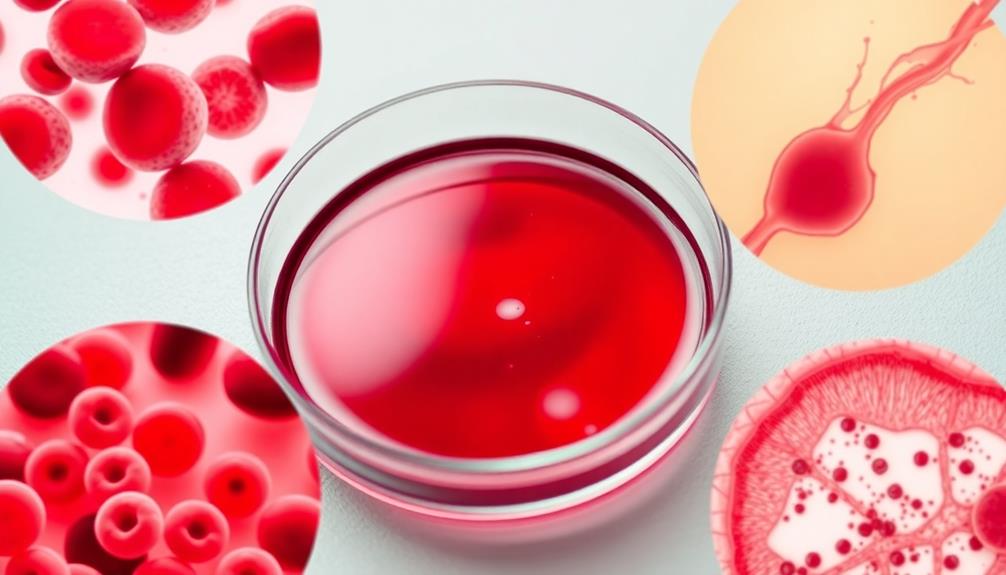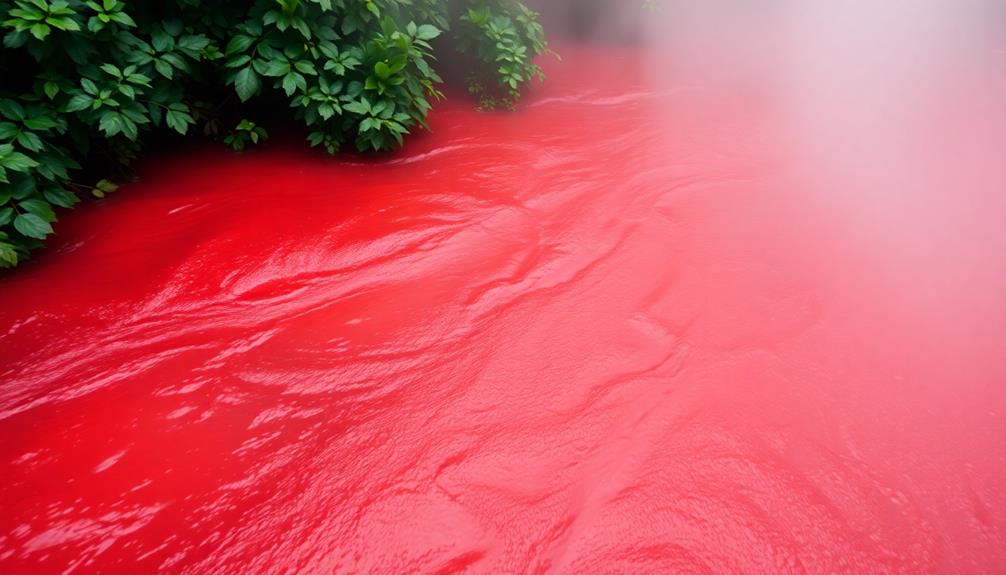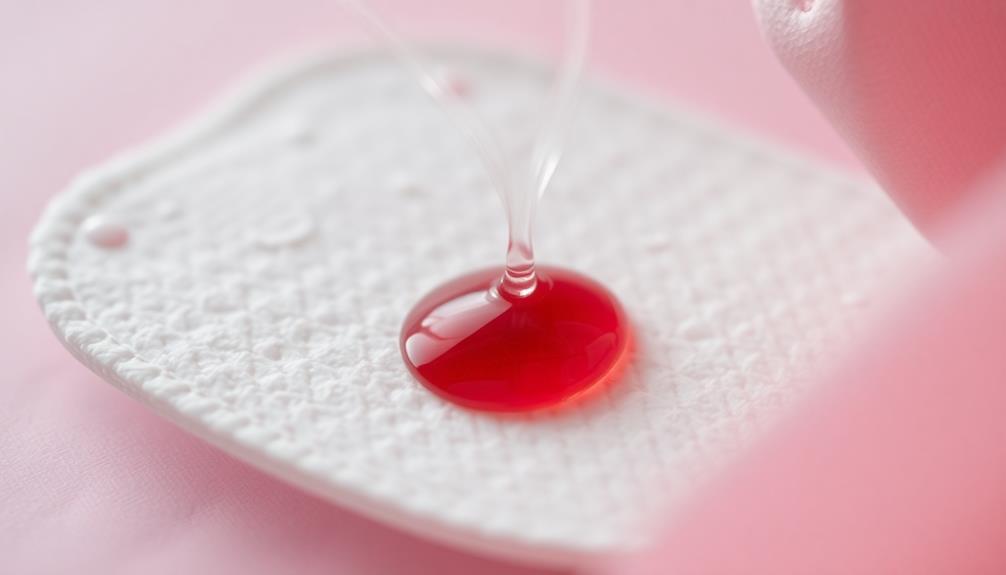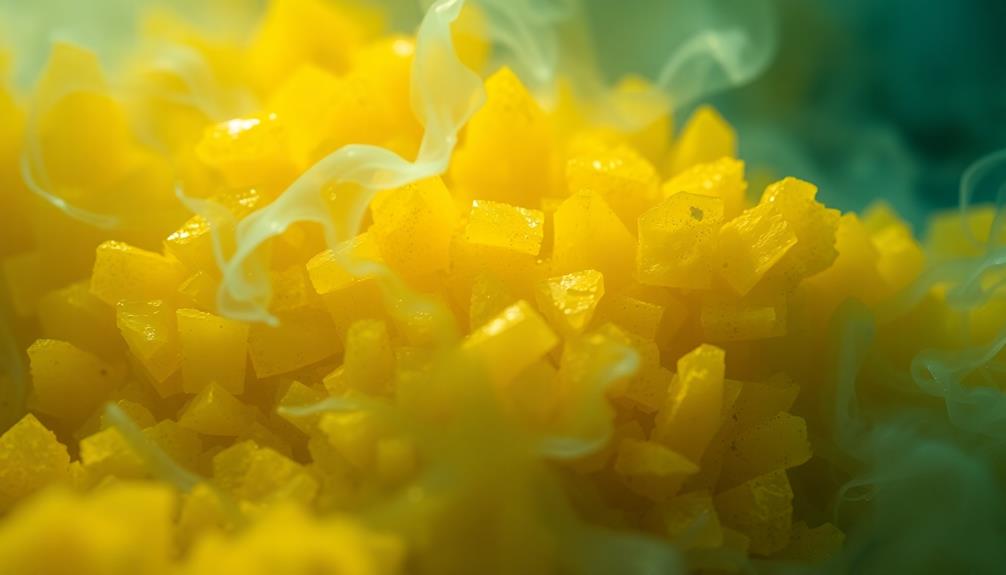Period blood usually has a light, metallic smell, and that's totally normal! You might notice it doesn't have much odor when it's fresh. As it mixes with bacteria, the smell can change. Sometimes, it might smell a little sweet or even fishy. If you ever notice a strong or unusual smell, it's a good idea to chat with a healthcare provider. Good hygiene can keep things smelling fresh, so remember to change your menstrual products regularly. Curious about what influences these scents? There's so much more to explore about your body's natural signals!
Key Takeaways
- Fresh menstrual blood typically has little to no smell, with variations occurring when mixed with vaginal bacteria.
- A metallic scent from iron is common and normal in period blood.
- Strong or fishy odors may indicate infections like bacterial vaginosis and should prompt medical consultation.
- Odor intensity can vary based on diet, hygiene practices, and hormonal changes throughout the menstrual cycle.
- Maintaining good hygiene and regularly changing menstrual products helps control and minimize odor.
Introduction

Menstrual blood can be a topic of curiosity and concern for many. You might wonder about the different smells that can come with it. The period blood smell can change due to various things like your diet, hormones, and how well you practice good hygiene.
Fresh menstrual blood usually doesn't have much of an odor. However, when it mixes with vaginal bacteria, you might notice some unusual smells.
Sometimes, the blood can have a metallic smell because of iron, which is pretty normal and not something to worry about. But if you notice a strong, fishy scent, that could be a sign of something like bacterial vaginosis. In that case, it's a good idea to see a healthcare provider for advice.
To keep odors at bay, regularly changing pads and maintaining good hygiene can really help. Remember, it's all part of a natural process, and staying informed can make it easier to manage.
Description of the Smell

The smell of period blood can vary significantly throughout your cycle. At the beginning of your period, you might notice a mild, metallic odor. This is due to the iron in the blood, and it can remind you of copper coins!
Fresh menstrual blood usually has little to no smell, which is pretty normal. However, as it mixes with bacteria in the vagina, the odor can change.
Some people report a sweet or fruity smell, which can happen because of the acidic environment and certain bacteria.
But watch out! A fishy odor can signal an infection like bacterial vaginosis, which means there's an imbalance in your healthy vaginal bacteria.
If you notice any persistent or foul smells during your period, especially if you feel uncomfortable or see other symptoms, it's important to check in with a healthcare provider. They can help rule out any health issues.
Source and Composition

A typical period consists of blood, uterine lining tissue, cervical mucus, and vaginal secretions, all of which contribute to its unique composition and odor.
Period blood is mainly made up of these components, creating a mix that can smell different for everyone. One common smell you might notice is a metallic scent, which comes from the iron in the blood. This scent is completely normal!
Sometimes, menstrual fluid can mix with bacteria that naturally live in the vagina. This can lead to different odors, like a fishy odor or even something that smells a bit rotten, but don't worry—this usually happens under certain conditions.
The pH level of period blood is typically between 3.8 and 4.5, which means it's mildly acidic and helps keep the bacteria in check.
Individual variations in scent can happen due to hormonal fluctuations, diet, and how much water you drink. These factors can create your very own unique scent during menstruation.
Typical Scenarios or Environments

In various settings, you might notice that the smell of period blood can change based on your surroundings and activities. When you're at home or in a well-ventilated area, the smell is often mild and metallic. This is completely normal and happens because of the iron in your blood.
However, in enclosed spaces like bathrooms, the odor might become stronger due to bacteria and moisture.
If you're out and about, you mightn't even notice the smell, especially if you keep up with good hygiene practices. Changing your menstrual products regularly can help keep odors in check. Additionally, wearing breathable fabrics and using unscented wipes can further help reduce any noticeable scent. It’s important to remember that menstrual odors vary from person to person and can be affected by factors such as diet and activity levels. Moreover, menopause and changes in body odor can also impact how a person perceives their scent during different life stages.
But during physical activities, like playing sports or dancing, sweat might mix with period blood, which can make the natural smell a bit more intense.
Different environments can affect how your period blood smells. Factors like what you eat, your hormones, and how well you care for yourself can all play a part.
Emotional or Cultural Associations

Many people experience a complex mix of emotions tied to the smell of period blood, shaped by cultural beliefs and personal experiences. For some, menstruation can feel sacred, representing the beauty of womanhood and empowerment. In these cultures, the smell may be seen as a natural part of life, celebrated rather than shamed.
However, in other places, societal norms create stigma around menstruation, leading to negative feelings and embarrassment. Your emotional responses to the smell can vary based on your background and experiences. If you've learned about menstrual health through cultural education, you might feel more comfortable and positive about it.
Some media portrayals can reinforce these feelings, while others may create fear or discomfort. Understanding these perceptions helps break down stigma. When we talk openly about menstruation, including its smells, we can create a more supportive environment.
This encourages everyone to embrace their experiences with confidence instead of shame. By sharing knowledge and feelings, we can turn what might seem like a taboo topic into a celebration of strength and health, making it a part of your journey rather than a burden.
Health or Safety Considerations

Understanding the emotions tied to the smell of period blood is important, but it's equally vital to recognize potential health implications. If you notice a strong smell or a fishy odor during your period, it could be a sign of bacterial vaginosis. This might need medical treatment, especially if you experience itching or unusual discharge.
Foul odors, particularly those that smell rotten, may mean you have retained menstrual products. It's best to visit a doctor for a check-up if you notice this.
You should also pay attention to any unusual smells if your discharge is yellow or green, as these can indicate infections like sexually transmitted infections.
To keep yourself healthy, maintain good hygiene habits, like changing your menstrual products regularly and bathing daily. These simple steps can help prevent odor-related health issues during menstruation.
Plus, regular gynecological check-ups are crucial for monitoring your menstrual health and addressing any concerns about smells that may come up.
Taking care of yourself is fun and important, so always listen to your body and seek help when you need it!
Final Thoughts

Navigating the complexities of period blood and its smell can feel overwhelming, but it's essential to prioritize your health and comfort.
Remember, period odors are often mild and can even be undetectable if you maintain good hygiene habits. Your menstrual products should be changed every 4 to 6 hours to keep things fresh.
A slight odor is normal during your menstrual cycle, but if you notice a strong fishy smell, it might be a sign of bacterial vaginosis, which you should discuss with a healthcare provider.
It's important to listen to your body. If you experience any persistent foul odors, don't hesitate to reach out for help.
Sometimes, our bodies can have unique smells due to hormonal changes or diet, and that's totally okay! Just keep in mind that a normal vaginal scent doesn't have to be overpowering.
Frequently Asked Questions
What Should Period Blood Smell Like?
When considering what period blood should smell like, you might notice a mild, metallic scent. However, if you detect strong or unusual odors, it's best to consult a healthcare provider for guidance.
What Does It Smell Like When Your Period Is Coming?
As your period approaches, you might notice a metallic scent due to iron in your blood. Hormonal changes can also create a mild, musky odor, which varies based on your body's unique chemistry.
Can Other People Smell My Discharge?
Yes, others can sometimes smell your discharge, especially if it has a strong odor. Maintaining good hygiene practices and regularly changing menstrual products can help prevent any noticeable smells that others might detect.
What Does Blood Smell Like?
Blood has a distinct, metallic smell due to iron content, often compared to copper coins. When exposed to air, oxidation can intensify this scent, while bacteria may introduce additional odors, creating a unique fragrance for everyone.









